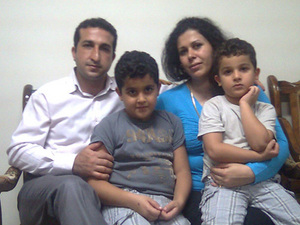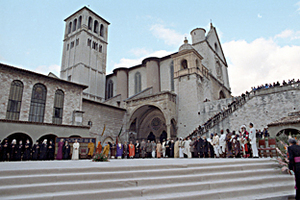Surveying what the ecumenical crowd has to say about this papal election is mixed at best. Time will tell about our interfaith friends, namely the Jewish and Muslim communities. It is said that Pope Francis has had very strong friendships with the Jewish community of Argentina.
On Wednesday night when Pope Francis was introduced to the world on the loggia he said, “And now let us begin this journey, the bishop and people, this journey of the Church of Rome which presides in charity over all the churches, a journey of brotherhood in love, of mutual trust. Let us always pray for one another. Let us pray for the whole world that there might be a great sense of brotherhood.”

Pope Francis Portrait Painting (Photo credit: faithmouse)
His All Holiness the Ecumenical Patriarch Bartholomew (of Constantinople) will attend the enthronement of the newly-elected Pope of Rome on March 19. This is the first time since 1054 that Orthodox bishops will be in attendance. Bartholomew will be accompanied by the Metropolitan of Pergamum, John (Zizoulas), the Metropolitan of Buenos Aires, Tarasios (a native of San Antonio, Texas) and the Metropolitan of Italy, Gennadios.
The Russian Orthodox Church’s Department for External Relations, Metropolitan Hilarion of Volokolamsk, spoke on Thursday that he thought a meeting between the Pope Francis and Patriarch Kirill of Moscow was “possible but the place and timing will depend on how quickly we will overcome the consequences of the conflicts from the turn of 1980s and 1990s.” Hilarion notes, “on several occasions, Pope Francis has shown spiritual sympathy towards the Orthodox Church and a desire for closer contacts.” The Orthodox still refuse to accept the fact that some Christians in the Byzantine East want, in their own freedom, be in communion with the bishop of Rome. Tensions run high when it comes to thinking about the Ukrainian Byzantine Church using the title of Patriarch for their head and the existence of Latin Catholic dioceses in Russia.
Continue reading Ecumenical and Interfaith leaders respond to the election of Pope Francis




